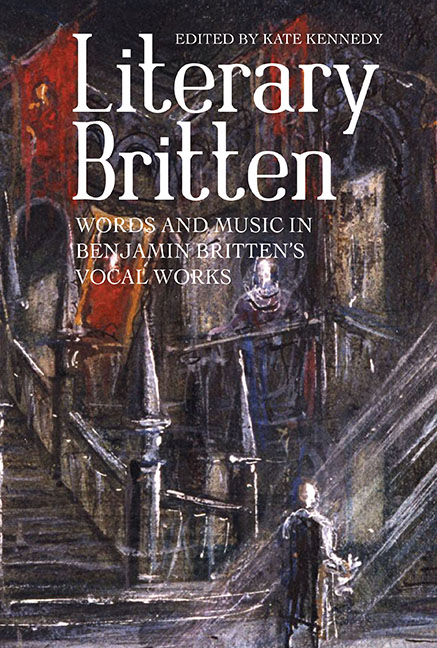Book contents
- Frontmatter
- Contents
- List of Illustrations
- List of Music Examples
- List of Contributors
- Introduction
- Part I Perspectives
- Part II Studies
- 9 Settings from Boyhood
- 10 ‘Practical Jokes’: Britten and Auden's Our Hunting Fathers Revisited
- 11 Choice and Inevitability: The Moral Economy of Peter Grimes
- 12 Sin, Death and Love: Britten's The Holy Sonnets of John Donne
- 13 Britten's Donne Meditation
- 14 Scenes from Britten's Spring Symphony
- 15 ‘I have read Billy Budd’: The Forster–Britten Reading(s) of Melville
- 16 Miles Must Die: Ideological Uses of ‘Innocence’ in Britten's The Turn of the Screw
- 17 Benjamin Britten and Medieval Drama at Chester: From Abraham and Isaac to ‘The Nativity’
- 18 Ambiguous Venice
- Bibliography
- Index
10 - ‘Practical Jokes’: Britten and Auden's Our Hunting Fathers Revisited
from Part II - Studies
Published online by Cambridge University Press: 17 July 2019
- Frontmatter
- Contents
- List of Illustrations
- List of Music Examples
- List of Contributors
- Introduction
- Part I Perspectives
- Part II Studies
- 9 Settings from Boyhood
- 10 ‘Practical Jokes’: Britten and Auden's Our Hunting Fathers Revisited
- 11 Choice and Inevitability: The Moral Economy of Peter Grimes
- 12 Sin, Death and Love: Britten's The Holy Sonnets of John Donne
- 13 Britten's Donne Meditation
- 14 Scenes from Britten's Spring Symphony
- 15 ‘I have read Billy Budd’: The Forster–Britten Reading(s) of Melville
- 16 Miles Must Die: Ideological Uses of ‘Innocence’ in Britten's The Turn of the Screw
- 17 Benjamin Britten and Medieval Drama at Chester: From Abraham and Isaac to ‘The Nativity’
- 18 Ambiguous Venice
- Bibliography
- Index
Summary
Writing about T. E. Lawrence in 1934, Auden drew upon a pronouncement of Lenin's that one must ‘go hungry, work illegally and be anonymous. […] The self must learn to be indifferent’. The first half of the quotation also, famously, ended Auden's poem ‘Our Hunting Fathers’, written in the same year. Despite the implicit allusion to the second part of Lenin's statement, Auden and Britten's Our Hunting Fathers, which featured the poem, has been viewed as anything but an expression of indifference. Already in Donald Mitchell's classic reading, the song cycle became composer and poet's passionate protest against the inhumanity of both fascist Europe and conservative Britain in 1936, an interpretation which renders the work prescient of Britten's later works highlighting suffering at the hands of violent or oppressive societies – in Peter Grimes and Billy Budd for instance. In more recent criticism, Mitchell's incipient suggestion of Britten's personal moral investment in the work has been pursued in readings of the work, like that of Stephen Arthur Allen, as an attempt by the young composer to reject conventional social mores and come to terms with his sexuality. Where interpretations have varied in focus, what they have agreed on is the overall sincerity of the work as an articulation of Britten's political, sexual and moral subjectivity in 1936. Such a conclusion is reinforced by three distinctive features of the work: firstly, the record of Britten's diaries from the period of composition point to a process of writing punctuated with horror and concern over the state of world events at the time. Secondly, the subjectivity of the work has appeared to be bolstered by its musical idiom. As Paul Kildea has written, explicitly linking Britten's music in the 1930s to the intense subjectivity of Viennese expressionism, the composer's exposure to modernism in this decade was the catalyst for ‘a complete breakdown in the polite distinction between art and emotion that had distinguished his output thus far’. Finally, while Philip Brett rightly asked whether Auden ‘ventriloquizes too insistently through his brilliant new pupil’ in the work, the poet's contribution has in general commanded far less attention than Britten's.
- Type
- Chapter
- Information
- Literary Brittenwords and music in benjamin britten's vocal works the boydell, pp. 206 - 222Publisher: Boydell & BrewerPrint publication year: 2018
- 1
- Cited by

